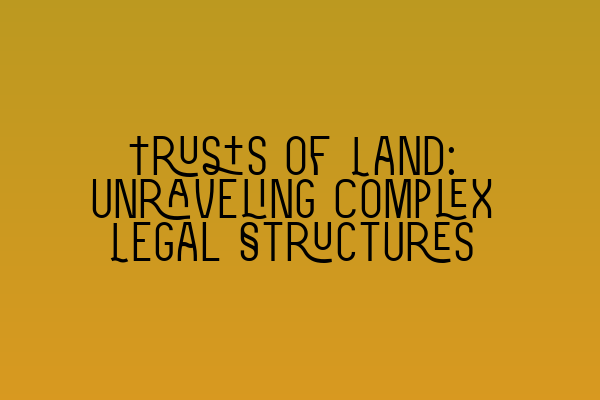Trusts of Land: Unraveling Complex Legal Structures
When it comes to property ownership and management, there are often complex legal structures involved that can be daunting to unravel. One such legal structure is the trust of land, which plays a significant role in property law and land law. In this blog post, we will dive deeper into trusts of land, exploring their purpose, types, and key considerations.
What is a Trust of Land?
A trust of land, also known as a land trust, is a legal arrangement where one party holds the legal title of the property (known as the trustee), while another party has beneficial ownership and enjoyment rights (known as the beneficiary). This arrangement ensures that the trustee manages and uses the property for the benefit of the beneficiary, adhering to the terms and conditions set out in the trust deed.
Trusts of land are commonly used for various purposes, including:
- Protecting the property from creditors
- Providing for the needs of certain individuals, such as minors or individuals with disabilities
- Preserving family wealth and assets for future generations
- Pooling resources for investment and development purposes
Understanding the different types of trusts of land is crucial in navigating the complexities surrounding this legal structure.
Types of Trusts of Land
There are several types of trusts of land, each with its unique characteristics and considerations:
Express Trusts
An express trust of land is created intentionally and explicitly by the individuals involved. This type of trust is commonly established through a trust deed or will, clearly outlining the trust’s terms, beneficiaries, and the trustee’s responsibilities. Express trusts of land provide certainty and clarity due to their written nature.
Example: A parent may create an express trust of land to protect their family home for the benefit of their children, stating that the property will be held in trust until the children reach a certain age.
Resulting Trusts
A resulting trust of land arises when an individual contributes towards the purchase of a property but does not hold the legal title. In such cases, a presumption arises that the legal owner (trustee) holds the property on trust for the individual who made the financial contribution (beneficiary). Resulting trusts can be either express or implied based on the parties’ intentions.
Example: A group of friends pool their funds together to purchase a property, but only one of them appears as the legal owner. In this scenario, a resulting trust may be established, with the legal owner holding the property on trust for all the friends involved.
Constructive Trusts
Constructive trusts of land are created by a court’s decision rather than an explicit agreement. They aim to rectify unjust enrichment or prevent unfairness. Constructive trusts usually arise when there is a breach of trust or fiduciary duty, resulting in the court imposing a trust arrangement to restore equity.
Example: A business partner misappropriates funds from a property investment project. In this case, a court may impose a constructive trust, requiring the partner to hold the property on trust for the other partners affected by the breach.
Key Considerations for Trusts of Land
When dealing with trusts of land, it is crucial to consider several key factors:
Legal Formalities and Documentation
Trusts of land require proper documentation and adherence to legal formalities. This includes creating a valid trust deed, clearly outlining the trust’s terms, parties involved, and the property’s details. Seeking legal assistance to ensure compliance with legal requirements is highly recommended.
Trustee’s Duties and Responsibilities
The trustee of a trust of land has legal obligations and responsibilities towards the beneficiaries. They must act in the best interests of the beneficiaries, manage the property diligently, and keep accurate records of financial transactions and property management. Failing to fulfill these duties can result in legal consequences.
Beneficiary’s Rights and Entitlements
Beneficiaries of trusts of land have certain rights and entitlements, including the right to occupy the property, the right to receive income generated by the property, and the right to be consulted on major decisions regarding the property’s use or sale. Understanding and protecting these rights is crucial for beneficiaries.
Dispute Resolution and Litigation
Disputes can arise in the context of trusts of land, particularly when disagreements occur between beneficiaries or between beneficiaries and trustees. In such situations, alternative dispute resolution methods, such as mediation or arbitration, can be explored. However, if resolution attempts fail, litigation may be necessary to resolve the dispute.
Trusts of land play a vital role in property law, offering individuals and families various ways to manage and protect their assets. Whether you are considering establishing a trust of land or dealing with an existing one, understanding the complexities and seeking professional advice is essential.
For more information on related topics, please check out these articles:
- Misrepresentation in Contracts: Unveiling Deceptive Practices
- A Closer Look at SQE Contract Law Syllabus
- SQE Contract Law: Analyzing Landmark Cases and Influential Judicial Decisions
- Understanding Contractual Capacity: Rights and Limitations
- Interactive SQE Mock Tests for Contract Law: Test Your Knowledge
